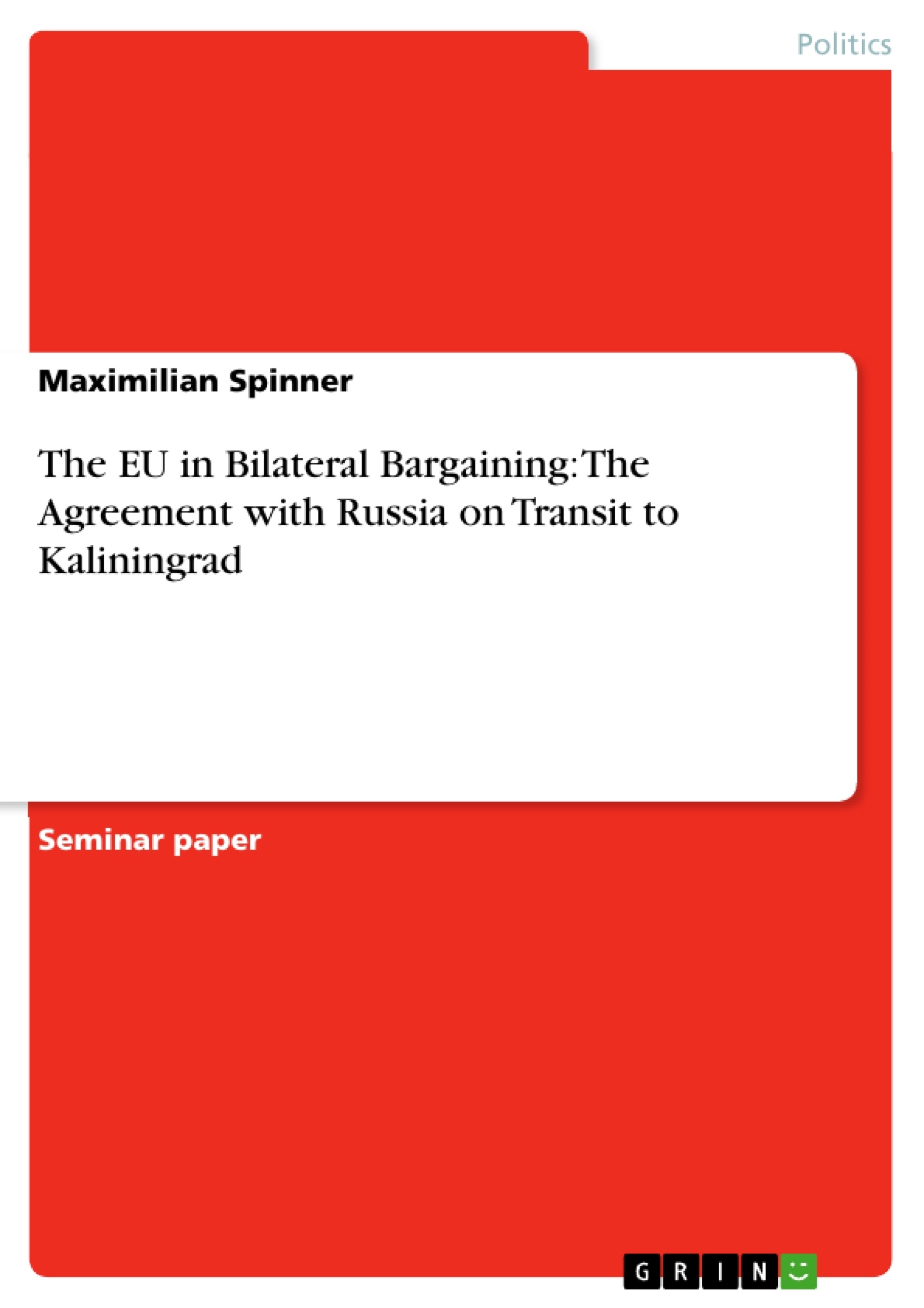This essay looks into the EU's approach to bilateral bargaining with a case study on the agreement with Russia on transit to its enclave Kaliningrad.
Inhaltsverzeichnis (Table of Contents)
- Introduction
- The Framework of Analysis
- Assessing EU-Russia bargaining on Kaliningrad
- Joint gains, joint losses and the costs of a non-agreement
- Negotiation strategies, agenda-setting, issue linkages and side-payments
- The role of individual member states
- The role of Poland and Lithuania
- Conclusion
Zielsetzung und Themenschwerpunkte (Objectives and Key Themes)
This paper examines the bilateral bargaining process between the EU and Russia regarding transit to the Russian enclave of Kaliningrad. It specifically analyzes the EU's limited bargaining power in this context, considering factors like the countervailing interests of member states and the impact on EU enlargement. The paper applies concepts of interdependence and two-level games to shed light on the complex dynamics at play.
- EU's bargaining power in bilateral negotiations with Russia
- The impact of member state interests on EU policy
- The role of the Schengen acquis in EU-Russia relations
- The implications of EU enlargement for bilateral bargaining
- The dynamics of two-level games in EU-Russia negotiations
Zusammenfassung der Kapitel (Chapter Summaries)
The introduction sets the stage by outlining the context of the EU's enlargement and the challenges posed by the Kaliningrad transit issue. It highlights the clash between Russia's demands for unrestricted travel and the EU's commitment to the Schengen acquis. The paper then presents the framework of analysis, drawing upon the concepts of interdependence and two-level games to provide a theoretical lens for understanding the negotiation process. The core of the paper focuses on analyzing the bargaining dynamics surrounding the Kaliningrad transit issue, examining factors such as joint gains and losses, negotiation strategies, and the roles of individual member states, particularly Poland and Lithuania. The analysis delves into the challenges faced by the EU in balancing its interests with those of its member states and navigating the complexities of negotiating with Russia.
Schlüsselwörter (Keywords)
This paper focuses on the EU-Russia relationship, specifically examining the complexities of bilateral bargaining in the context of EU enlargement. Key concepts explored include interdependence, two-level games, the Schengen acquis, transit rights, and the role of individual member states in shaping EU policy. The paper delves into the negotiation process surrounding the Kaliningrad transit issue, highlighting the challenges and compromises involved in reaching an agreement. The analysis draws upon theoretical frameworks to explain the EU's limited bargaining power and the impact of member state interests on EU policy.
Frequently Asked Questions
What is the Kaliningrad transit issue?
It concerns the movement of Russian citizens and goods between mainland Russia and its enclave, Kaliningrad, which became surrounded by EU territory after enlargement.
Why did the EU and Russia have a conflict over this?
Russia demanded unrestricted travel, while the EU insisted on applying the Schengen acquis rules to maintain border security and control.
What role did Poland and Lithuania play?
As the primary transit countries and new EU members, their interests and border security were central to the bilateral bargaining process.
What are "two-level games" in this context?
The term describes the complexity of the EU negotiating with Russia (level 1) while simultaneously having to reach a consensus with its own member states (level 2).
How did EU enlargement affect the bargaining power?
Enlargement created new geographical realities that forced the EU to balance its internal Schengen commitments with the necessity of a stable relationship with Russia.
- Citation du texte
- Maximilian Spinner (Auteur), 2003, The EU in Bilateral Bargaining: The Agreement with Russia on Transit to Kaliningrad, Munich, GRIN Verlag, https://www.grin.com/document/13304



